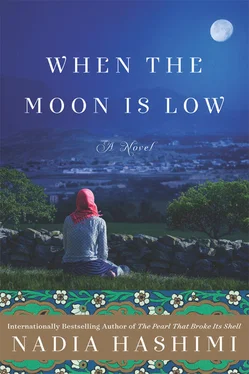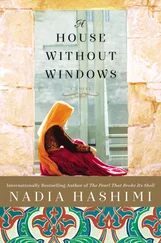“My son, go on back upstairs with your sister and sleep. I’ll wait for your father.”
I knew he was scared. I knew he wanted to be useful. He wanted to do things that would make Mahmood proud.
Samira was just nine years old on that night. She was an extension of me. Her moods ebbed and flowed in response to my own, just as the tides respond to the moon. If I brooded, Samira quieted, blowing her dark bangs away from her crinkled forehead. If I was happy, my daughter walked with a skip in her step. On that night, Samira became silent and trembled. With her hands drawn into tight, little fists, tears darkened her pillowcase.
SALEEM WOKE AT DAWN AND FOUND ME ON THE LIVING ROOM couch. I sat with my head against the wall. I cannot imagine what I must have looked like to him.
“Madar- jan ?”
He had to call out to me twice.
“Yes, Saleem,” I said. My throat was dry and raw.
Saleem hadn’t known what to say. He simply felt obligated to break the silence and gauge the situation.
“Did you sleep, Madar- jan ?”
I sat with my hands wrapped around the round of my belly; my swollen feet barely reached the floor.
“Yes, my son.”
He looked doubtful and offered to bring me tea. I looked at Saleem, his hands wringing behind his back, his face knotted with fear. It was time for me to be a mother again.
“It is early still,” I’d said. “It would be good to pray for your father.”
We didn’t bother to heat the water for the ablutions.
“In the name of God. .” I whispered and began to wash my hands, mouth, and nose. I steeled myself against the icy touch of the water. I would not show weakness. I washed my face, behind my ears, my hands and feet.
With a rehearsed rhythm, Saleem and I stood, kneeled, and bowed as we mouthed the phrases we’d both memorized very early in our lives. I could feel my eyes glaze as I thought of the previous night.
I didn’t know if my husband would ever be returned.
Our home froze in time, waiting for a sign.
Saleem helped with some chores and, though he was young, with going to the market for our basic needs. I was isolated. My siblings had fled Afghanistan along with KokoGul. My father stayed behind to look after his orchard, an hour from where Mahmood and I had settled. Mahmood’s family was similarly dispersed, his sisters living in Australia. All we had left were distant cousins who were struggling, as we were, to feed their families and survive Kabul’s new order. I sent word to our families. They were distraught, but not in any position to help. Mahmood’s sisters begged me to keep them informed if I heard from their brother.
RAISA, ABDUL RAHIM’S WIFE, CAME BY FREQUENTLY AFTER HEARING the news of Mahmood’s disappearance. Some days, she sent a plate of butter or a small pot of rice. Raisa had always been a dear friend, but I dreaded her visits after his disappearance. Her eyes, moist with pity, were brutal reminders of everything that was wrong.
She had a matronly softness, a bosom that offered to pull you in and rock you to sleep as if you were one of her many children. On those bleak days, Raisa would stop by for short visits. Without a pause in conversation, she would tidy the kitchen and make a quick dish with whatever she could find in our cupboards.
“Fereiba- jan, any word?” she would ask vaguely.
“Not yet, but I’m sure any day now,” I would say and I believed it. Mahmood was a marvel. I had no reason to expect anything less from him.
“Well, if there’s anything that you and the children need. .”
I steeled myself. I tried to keep the house in order, to give my children a way to sleep easy in the night. Samira mirrored my composure during the day but at night, her dark bangs clung to the cold sweat of her forehead. She whimpered and wailed in her sleep, a language I understood but refused to speak.
I FOUND SALEEM’S NOTEBOOK. THERE WERE HASH MARKS ON THE back cover. He was counting the days since that night. There were forty-seven marks.
We were a home without a patriarch, the type of creature Kabul’s beasts devoured on sight. On the day I was struck with sharp pains, I realized just how isolated we were without a man in the home. For hours, I’d turned my face to the wall when the pressure overwhelmed me. The children said nothing. We each played our part in the charade of normalcy.
But the fear of losing my unborn, of having Mahmood return to find me without his child, was enough to drive me out of the house without a proper escort. I slipped on my burqa and took Saleem by the hand. I left Samira with Raisa- jan, who pulled my daughter against her chest and nodded. She could offer nothing else.
“Saleem- jan, forgive me if I squeeze your hand too hard, bachem .” The pain was sharp and came with such force, I nearly doubled over.
“Are you very sick, Madar- jan ?” Saleem asked quietly once we’d turned off our street.
“No, bachem . I’m sure it’s fine. Everything will be better once your father comes home.”
The look of doubt on Saleem’s face did not go unnoticed. My confidence was beginning to stutter and stumble. Samira had sensed it too. Every day, she retreated further into herself.
“Is the baby coming now?” Saleem questions were practical. He was so much like his father. I hadn’t realized just how much he’d grown in the last year.
“God forbid, bachem . It’s still too soon. Babies need nine months and nine days. Nine months and nine days,” I repeated, hearing my mother-in-law’s voice. There was much she’d shared with me before she’d left us, squeezing a lifetime of mothering into a few short years. She’d been the one to hurry the midwife to our home when my labor pains began with Saleem and Samira. She’d held my hand as I’d brought her grandchildren into the world. As the time grew near for this child, I felt her absence more and more.
With one hand on my belly and my eyes to the ground, I did not notice the three men round the corner. We were just a hundred meters from the hospital entrance.
“Have you no self-respect, woman? Where is your mahram ?” A glob of saliva landed at my feet. I took a step back. My son’s grip tightened on my fingers. I tried to position myself in front of him.
“This is my son. He is escorting me to the hospital. I am in severe pain and am in a. . condition.”
Were these the men who had come for Mahmood? Would they know anything about his whereabouts? Before I dared to ask, a stick cracked on my shoulder. I doubled over, my hands covering my belly.
“Please don’t!” Saleem cried as he threw himself over my crouched form.
“Only loose women speak of such matters so openly! Have you no shame in front of your son? Where is his father? Or maybe he does not have one.”
My body quaked with rage, but I said nothing. I had to be practical too.
“We ask your forgiveness. Please let us be on our way,” I said through gritted teeth.
“Get back to your home. Go home with your boy and try to carry yourself as a respectful Muslim woman. You have no need for the hospital. Keep your woman troubles to yourself and spare your son the shame of being seen with you.”
Sharp pains pierced my pelvis and shoulder, but I got back on my feet. I pulled my bewildered son by the hand and turned around. After just one step, I felt a snap against my back. They’d lashed out twice more, for good measure. I squeezed Saleem’s hand, anticipating his reaction.
“Madar!” He was angry.
“Say nothing, bachem ,” I whispered. “Let’s be on our way, my love. I am fine.”
Saleem’s face burned with fury. It hurt him to do nothing, even if it was what I asked. In bringing him as my escort, I’d asked him to be the man of our home. In telling him to do nothing, I’d struck him back down to a boy. He supported me as I hobbled back home. For an Afghan, pride is harder to swallow than a bag of nails.
Читать дальше












